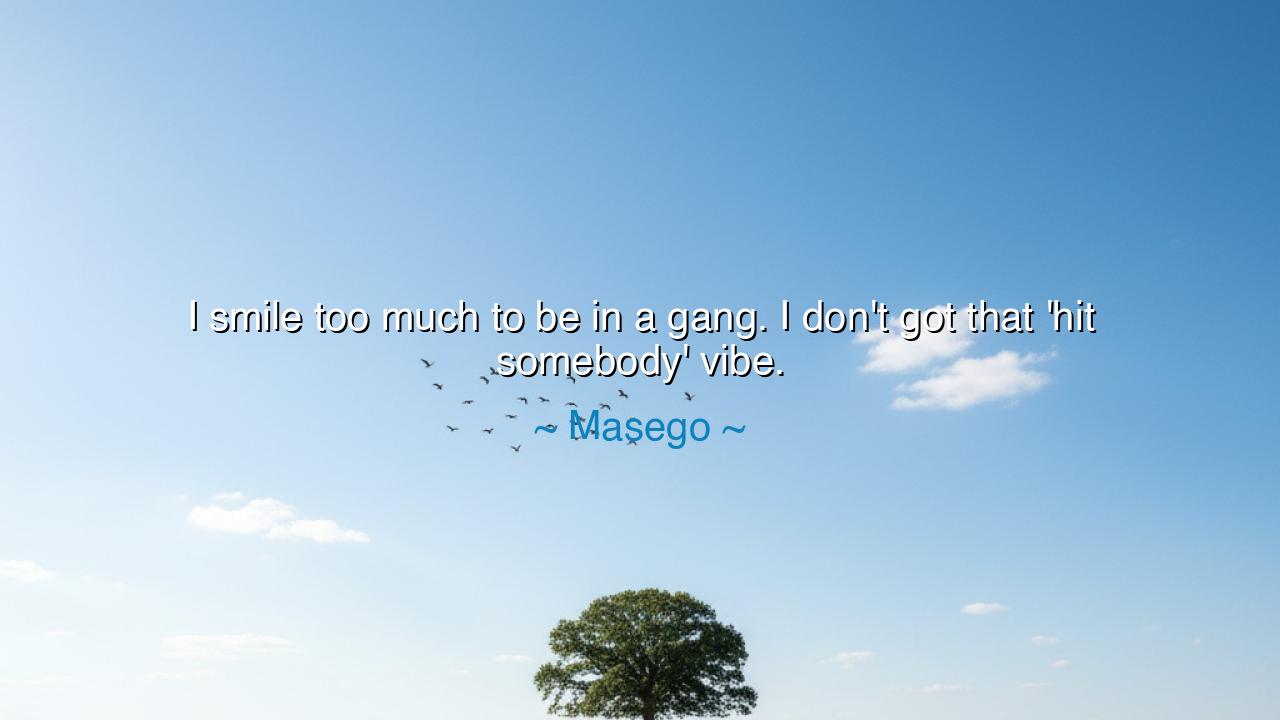
I smile too much to be in a gang. I don't got that 'hit somebody'






Hear the playful yet profound words of Masego: “I smile too much to be in a gang. I don’t got that ‘hit somebody’ vibe.” Though spoken with lightness, these words carry the weight of wisdom. They are not simply a jest, but a declaration of identity, a refusal to be shaped by violence or bitterness. In them we hear the ancient truth that a man’s spirit is revealed not by the force of his fists, but by the light of his countenance. To smile is to declare allegiance not to destruction, but to life itself.
The ancients often taught that the face is the mirror of the soul. A scowl reveals a heart bent by anger; clenched fists speak of unrest within; but the smile proclaims harmony, openness, and peace. Masego’s words remind us that the spirit of violence, the “hit somebody vibe,” belongs to those chained by rage. But one who smiles freely belongs to a higher path. Such a person cannot thrive in a brotherhood of destruction, for his very nature rejects it. His smile becomes a shield, disarming hatred before it strikes.
Consider the story of Mahatma Gandhi, who stood against one of the mightiest empires the world had ever known. Though others raised weapons, he raised only his hand in greeting and his lips in a gentle smile. Many thought him weak; yet his strength toppled armies, not through blows, but through peace. His enemies could strike his body, but they could not pierce the serenity of his spirit. Gandhi, like Masego, lived without the “hit somebody” energy; instead, he radiated a force far greater—the energy of compassion, which reshapes the world more deeply than violence ever could.
History gives us another example in St. Francis of Assisi, who walked into the camp of the Sultan during the Crusades. He had no sword, no shield, only a gentle demeanor and a fearless heart. He spoke not with threats but with kindness, not with hostility but with peace. Though surrounded by warriors, he remained untouched, for his spirit carried no malice. This is the essence of Masego’s saying: when the heart is filled with goodwill, there is no room for violence, and others recognize it instinctively.
The meaning of the quote is thus twofold. First, it affirms the power of self-knowledge: to recognize that one is not made for anger, but for joy. Second, it teaches that peace is not weakness, but strength expressed differently. To smile is not to surrender, but to stand firm in the choice to live without hatred. Masego declares that his path is not one of fists and fury, but one of lightness, music, and joy—a path that, though different, is no less heroic.
What lesson, then, must we pass on? It is this: do not measure strength only in the clenched hand or the raised voice. Measure it also in the courage to remain gentle in a violent world, to keep smiling when others demand scowls, to walk in peace when others march toward conflict. The world has enough of the “hit somebody” energy; what it lacks is the strength of those who refuse to be consumed by it.
Practically, let us live this teaching in small acts. When provoked, pause and let the smile guard your spirit. When pressured to join in anger, choose instead to disarm with humor, kindness, or silence. When faced with hostility, do not mirror it, but shine back calmness. In this way, your life becomes proof of a greater strength—the strength of peace, the strength of joy.
Thus, Masego’s words, though playful, carry the gravity of ancient counsel. Smile too much for violence. Refuse the spirit of destruction. Live in harmony with yourself and with others. For in the end, the smile is mightier than the clenched fist, and joy builds what anger can only tear down. This is the teaching to carry forward, and the legacy to leave behind.






AAdministratorAdministrator
Welcome, honored guests. Please leave a comment, we will respond soon